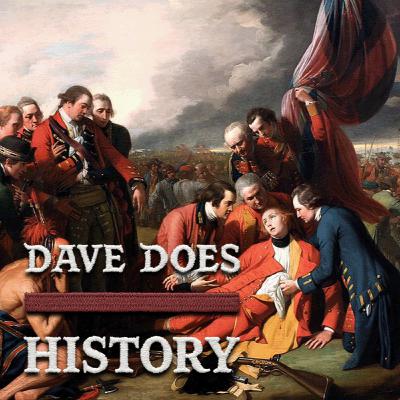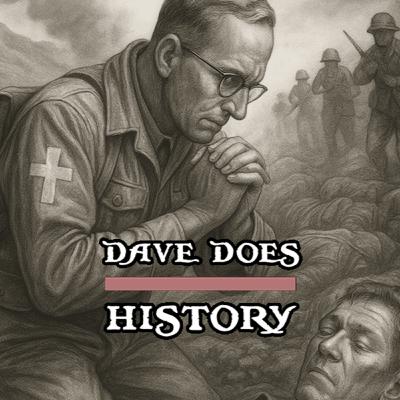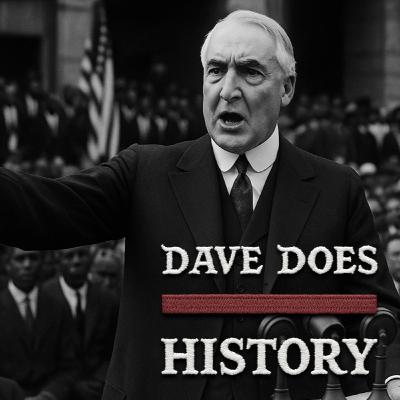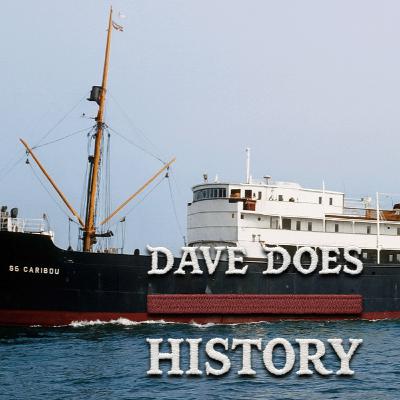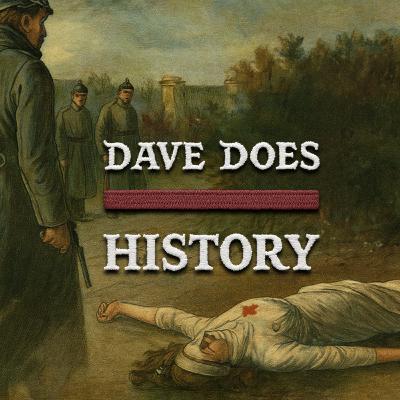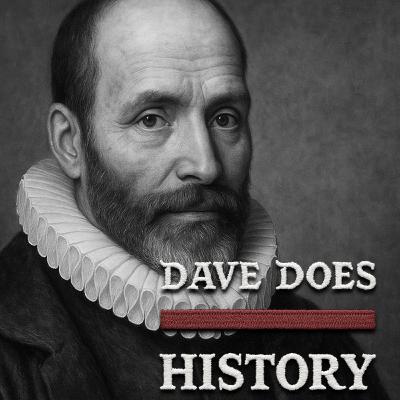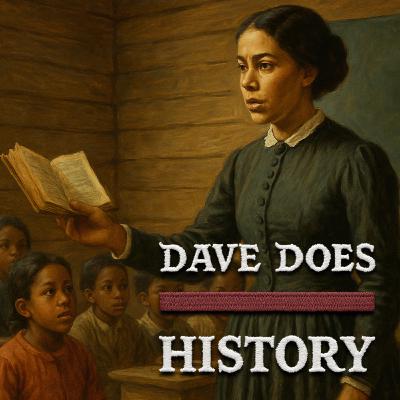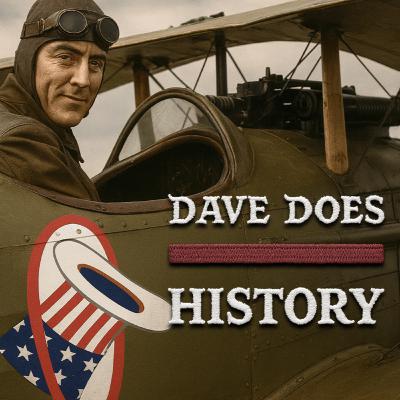Discover Dave Does History
Dave Does History

Dave Does History
Author: Dave Bowman
Subscribed: 12Played: 283Subscribe
Share
© Dave Bowman
Description
Dave Does History takes listeners on an engaging journey through the moments that shaped the world we live in today. Hosted by Dave, a passionate historian with a knack for storytelling, the podcast explores pivotal events, unsung heroes, and the complex forces behind historical turning points. With a conversational tone and a deep understanding of the past, Dave makes history accessible, relatable, and downright fascinating.
514 Episodes
Reverse
In September of 1759, two armies faced each other on a plateau outside Quebec City, on land that belonged to a farmer named Abraham Martin. History remembers it as the Battle of the Plains of Abraham.James Wolfe, the young British general already dying of illness, gambled everything on a nighttime landing and a climb up a cliff the French thought was impassable. By dawn, four thousand redcoats stood ready. Montcalm, the French commander, chose to attack immediately rather than wait for reinforcements.The French fired too soon. The British waited, then unleashed a crushing volley at close range. Within minutes the French line collapsed. Wolfe was shot three times and died hearing of his victory. Montcalm was mortally wounded and died the next day.The battle lasted less than an hour, but it ended French Canada, gave Britain control of the St. Lawrence, and set the colonies on the road toward revolution.
On July 16, 1950, in the early chaos of the Korean War, a Catholic chaplain named Father Herman Felhoelter made a choice that would define the very idea of sacrifice. Surrounded by wounded American soldiers who could not be moved, he stayed behind as the enemy advanced.He knelt to pray over the dying and was gunned down mid-prayer, alongside the men he refused to leave.This is the story of the Chaplain–Medic Massacre, one of the first and most horrifying atrocities of the war. It is a story of faith, courage, and the cold brutality of battle.But more than that, it is a story that reminds us what it means to stand for something greater than yourself. In this episode of Dave Does History, we remember the man who carried no weapon, wore a cross on his arm, and walked into eternity doing what he was called to do: pray.
In the early months of World War II, deep beneath enemy waters, the crew of the USS Silversides faced an unimaginable challenge: an emergency appendectomy performed without a doctor, using improvised tools, and under constant threat of enemy attack.
Join us as we dive into the incredible story of Pharmacist’s Mate Thomas A. Moore, who defied the odds to save his crewmate’s life in one of the most daring medical feats in naval history. From bent spoons as surgical tools to a harrowing depth charge escape, this episode captures the ingenuity, resilience, and courage that defined the silent service during WWII.
Tonight, we turn to one of the darkest nights in Los Angeles history, October 24, 1871. On that night, a mob of hundreds stormed through Chinatown and lynched at least eighteen Chinese immigrants. The victims were doctors, shopkeepers, and laborers, dragged from their homes and executed in the streets.This was not a random act of violence. It was the result of years of rising hatred, fear, and resentment aimed at a community that helped build the city itself. The massacre shocked the nation but led to few consequences for those responsible.In this episode, we’ll uncover what led to that night, what happened in its aftermath, and how the event has been remembered, forgotten, and rediscovered in the long story of America’s struggle with race and justice.
Today we turn back to 42 BCE, to the plains of Macedonia, where the fate of Rome was decided. The Battle of Philippi was not just another clash of legions. It was the final act in the long death of the Roman Republic. On one side stood Brutus and Cassius, men who believed they had saved freedom by killing a tyrant. On the other were Mark Antony and Octavian, men who believed they were avenging Caesar. Their struggle was more than a fight for power. It was a fight over the very idea of Rome itself.What happened there would shape the next five hundred years of Roman history and leave lessons that still haunt every republic that forgets its purpose.
On an October afternoon in 1777, six hundred cold, hungry Americans waited behind a half-finished wall of mud and timber. Across the field marched two thousand Hessians, drums beating, flags bright in the smoke. The British expected an easy victory. What they got instead was one of the bloodiest, fastest defeats of the war. For forty minutes at Fort Mercer—better known as the Battle of Red Bank—the outnumbered defenders shattered the enemy, sank two British warships, and bought George Washington the time he needed to get his army to Valley Forge.But there’s more to this story than cannons and courage. It’s about forgotten heroes, Black and Native soldiers written out of history, and a recent discovery that’s forced us to face the battle’s human cost all over again.
In October 1921, President Warren G. Harding traveled deep into the American South to do something no president had ever dared. Standing before a segregated crowd in Birmingham, Alabama, he condemned lynching and declared that democracy was a lie if it excluded Black citizens. It was a moment of courage from a man not known for boldness.This week on Dave Does History, we look back at Harding’s remarkable speech, the storm it caused, and the larger struggle to pass the Dyer Anti-Lynching Bill. We’ll explore how the NAACP’s relentless campaign helped shape a reluctant president and how a single afternoon in Birmingham challenged the conscience of a divided nation.Harding’s words didn’t end racial violence, but they cracked the silence that allowed it to thrive. Sometimes, history reminds us that courage can come from the most unexpected places.
In 1774, the American colonies found themselves at a breaking point. Britain had punished Boston for its rebellion, and the rest of the colonies were told to fall in line or face the same fate. Instead, they chose unity. In Philadelphia, delegates gathered for the First Continental Congress and drafted a document that would quietly change everything. It wasn’t a declaration of war. It wasn’t even a call for independence. It was a promise. A pledge to stop buying British goods, to live with restraint, and to enforce those rules on their neighbors.The Continental Association turned thirteen divided colonies into a single movement. It made ordinary people responsible for defending liberty with their own choices, in their own towns, every day. Before the shots at Lexington, before Jefferson’s words in 1776, this was how America began to act like a nation.
The dust of North Africa still whispers the story. It was October 19, 202 BCE, and two men faced each other across the plains of Zama. On one side, Hannibal Barca, the Carthaginian who had crossed the Alps with elephants and fury. On the other, Scipio Africanus, the Roman who had learned from every one of Hannibal’s lessons and turned them against him. The Battle of Zama ended seventeen years of brutal war and decided who would rule the world. It was the clash of two minds, two nations, and two visions of power. Hannibal fought for survival. Scipio fought for destiny. When the dust settled, Rome stood tall, and Carthage began its long fall into memory. This was not just the end of a war. It was the birth of empire. And it all began in the red dust of Zama.
On October 18, 1775, the sky over Falmouth turned the color of iron and the Royal Navy lit a match. Lieutenant Henry Mowat’s squadron opened fire for nine hours on a coastal town that is now Portland, Maine. The lesson meant to be taught was fear. The lesson that landed was resolve.Today we tell the story of how a wooden harbor became a furnace, why the British thought terror would tame New England, and how the ashes helped push Congress toward a navy of its own. We will meet the people who ran, the few who fought, and the officers who sailed away convinced they had proved a point.This is not nostalgia. It is a reminder. When power chooses punishment over law, neighbors choose each other. The bombardment of Falmouth did not end the rebellion. It fed it. Pull up a chair, pour a coffee, and listen in.
On October 17, 1777, the tide of the American Revolution turned on a muddy field beside the Hudson River. British General John Burgoyne, once the pride of London’s military circles, surrendered his sword to American General Horatio Gates in what became known as the Surrender at Saratoga.This was not just another battle. It was the moment when the world began to believe that the colonies might actually win. The British plan to cut New England off from the rest of the colonies collapsed under poor coordination, stubborn terrain, and fierce American resistance. When Burgoyne’s army finally laid down its arms, six thousand redcoats became prisoners, and a new chapter opened in the war for independence.The victory at Saratoga convinced France to join the fight, bringing ships, money, and legitimacy to the American cause. The Revolution had found its turning point, and freedom had found its footing.
On October 16, 1793, the streets of Paris echoed with the wheels of a cart carrying a queen to her death. Marie Antoinette, once the glittering symbol of royal grandeur, now sat pale and silent, hands bound, a prisoner called the Widow Capet. Her fall from grace was a slow collapse, born of rumor, resentment, and revolution. The woman who once ruled the most elegant court in Europe became a scapegoat for a starving nation and the embodiment of everything the people despised about monarchy.In today’s episode, we follow her final journey from the darkness of the Conciergerie to the bright scaffold at the Place de la Révolution. We will look at the trial that condemned her, the words that silenced a courtroom, and the poise that outlasted her crown. This is the story of Marie Antoinette’s last day and the Revolution’s defining moment.
On this episode we head down the flat road into Raft Swamp, where the pines close in and the ground swallows hoofprints. The date is October 15, 1781. The British are about to surrender at Yorktown, but here the fight still decides who controls the Cape Fear country. Loyalists gather on high ground and tear up a bridge, certain that cavalry will balk at water and mud. Major Joseph Graham ignores the script. He drives his dragoons off the road, through the wet, and up onto the causeway. The fight turns fast and rough. Sabres do the work. A rearguard fails. The night ends with trumpet calls and a broken Loyalist army.This is the end of something in North Carolina. It is also a reminder about boldness and terrain. The last big Tory force in the state dissolves, and the road to Wilmington opens. History does not always turn on a famous field. Sometimes it turns in a swamp.
In the dark, frigid waters of the Cabot Strait, just after midnight on October 14, 1942, the passenger ferry SS Caribou was making her familiar run from Nova Scotia to Newfoundland. Onboard were soldiers heading home, mothers with children, sailors on leave, and the crew who knew every wave of that crossing.Then, from beneath the black surface, the German submarine U-69 struck. One torpedo, one flash of fire, and within minutes the Caribou was gone, taking more than half of those aboard with her. The escort, HMCS Grandmère, dropped depth charges before turning back to rescue the survivors.What followed was a night of loss, courage, and bitter questions about duty and humanity at war. This is the story of that attack, of the ship and the people who went down with her, and of a nation that learned just how close the war had come.
October 13, 1903, marked a new chapter in American sport. On that cool autumn afternoon at the Huntington Avenue Grounds, the Boston Americans made history, defeating the Pittsburgh Pirates three to nothing and claiming the very first World Series championship. Before a crowd of more than seven thousand cheering fans, Bill Dinneen pitched a masterpiece, scattering four hits and striking out seven, including the mighty Honus Wagner for the final out. The stands erupted as the Royal Rooters sang “Tessie” and waved their flags high. Baseball, once divided by rival leagues, had found its champion and its crown. In this episode, we look back at the day Boston took its place in the record books, when courage, skill, and a steady arm sealed a victory that would shape the future of the game forever. This is the story of Game Eight, the birth of the World Series.
On the morning of October 12, 1915, in German-occupied Brussels, a British nurse named Edith Cavell faced a firing squad. Her crime was compassion. She had sheltered Allied soldiers and helped them escape to neutral Holland, believing that saving lives mattered more than obeying military law. The Germans called it treason. The world called it murder. Her calm courage, her final words of forgiveness, and her refusal to hate turned her into a global symbol of conscience in wartime. In Britain, her death doubled recruitment and fueled outrage. In America, it hardened hearts against Germany. But beyond propaganda, Edith Cavell’s story is about one woman’s unwavering belief that mercy knows no borders. In this episode of Dave Does History, we look back at her life, her faith, and the day the world learned that even in war, decency can stand its ground against power.
It was the night the U.S. Navy took back the darkness. On October 11, 1942, off Cape Esperance near Guadalcanal, Rear Admiral Norman Scott led a small task force into waters already littered with wreckage from earlier defeats. His orders were clear: protect the convoy, challenge the Japanese, and prove that America could fight—and win—at night. What followed was chaos and courage in equal measure. A radar misunderstanding opened the battle, unleashing a storm of gunfire that tore into the Japanese column. The destroyer Duncan charged alone. The cruiser Boise took a shell to her forward magazines and refused to die. By dawn, one Japanese heavy cruiser and two destroyers were gone, and the Americans had their first clean victory of the Pacific night war. It was brutal, it was costly, and it was exactly what the fleet needed. This is the Battle of Cape Esperance.
In the sixteenth century, when theology could start wars and conscience could get a man killed, Jacobus Arminius dared to question the idea that God’s will left no room for human choice. Born in the war-torn Dutch town of Oudewater on October 10, 1560, Arminius rose from tragedy to become one of Europe’s most provocative theologians. His belief that divine grace invites rather than coerces set him at odds with the rigid Calvinism of his time. He taught that love must be freely returned, that faith cannot be forced, and that God’s justice must be as merciful as it is sovereign. For that, he was condemned in life and immortalized in controversy. Today, his name echoes wherever people wrestle with the tension between destiny and decision. This is the story of a scholar who fought for freedom of the soul when certainty ruled the mind.
She was born free in a time when freedom was rare, and she spent her life proving what it truly meant. Mary Ann Shadd Cary was a teacher, journalist, lawyer, and activist who refused to accept the limits placed on her because of her race or her gender. From the Underground Railroad stops of her childhood home in Delaware to the classrooms of Canada West and the editorial desk of The Provincial Freeman, she lived her belief that “self-reliance is the true road to independence.” She taught children to think, challenged men to act, and urged a divided nation to live up to its promises. In this episode, we look at the remarkable life of the first Black woman to publish a newspaper in North America, a fearless voice who reminded us that progress depends on courage, and that real change begins when we do more and talk less.
He was the kind of man who made danger look like routine. Eddie Rickenbacker grew up on the rough streets of Columbus, Ohio, fixing engines and outrunning bad luck. By the time America entered World War I, he was already famous as “Fast Eddie,” a race car driver who understood speed better than fear. When he climbed into a SPAD fighter with the 94th “Hat in the Ring” Squadron, he became the nation’s most decorated ace, claiming twenty-six victories and the Medal of Honor. But his legend didn’t stop when the shooting did. Rickenbacker built cars, ran the Indianapolis Motor Speedway, and later turned Eastern Air Lines into an aviation powerhouse. He survived plane crashes, a month adrift in the Pacific, and every test life threw at him. This is the story of America’s original iron man — Captain Eddie Rickenbacker, the man who refused to quit.


